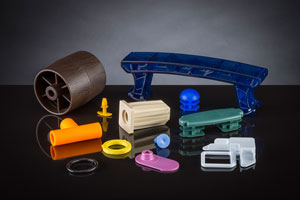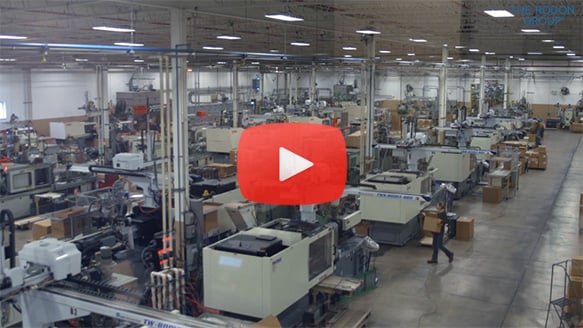Plastic Injection Molding
Many businesses turn to injection molding for high-volume, intricate parts. The process provides many benefits, including a high production level while minimizing the cost per unit. To determine if custom plastic injection molding suits your application, you should understand the varying materials and surface finishes available.

Custom Plastic Injection Molding Materials
The varying plastic types used in custom injection molding allow for various melting points required for different applications.
- Acrylonitrile Butadiene Styrene (ABS): A common thermoplastic used for products that do not require chemical, electrical, or UV resistance. ABS is a flexible and lightweight material with good impact strength and durability. Many everyday objects use ABS custom injection molded parts, such as children’s toys, components in household appliances, and automotive parts.
- Low-Density and High-Density Polyethylene (LDPE and HDPE): As one of the most versatile thermoplastics, LDPE and HDPE have high tensile strength, impact resistance, and moisture resistance. HDPE is a material used in a range of consumer and industrial products, while LDPE is a softer version popular in consumer and industrial production.
- Polycarbonate (PC): As a transparent, lightweight material, PC is a durable alternative to glass. With high durability and extreme impact resistance, many demanding applications use PC, including bulletproof glass.
- Polyamide (Nylon): Nylon offers excellent electrical properties, strength, and resistance to heat wear, and chemicals. Applications in the medical and automotive industries often use nylon for custom plastic injection molded parts.
- High Impact Polystyrene (HIPS): As a versatile, impact-resistant, and economical plastic, HIPS consists of crystal styrene and rubber. With non-toxic properties, HIPS is ideal for food-grade components.
- Polypropylene (PP): With excellent chemical and stress resistance and high impact strength, PP is a robust plastic with a high melting point. PP is often used as a food-grade polymer in the food and beverage industry.
Surface Finishes for Plastic Injection Molding
Custom injection molded plastic parts have several surface finish options to accommodate the roughness a part requires. The Society of the Plastics Industry (SPI) sets the standards of the US plastics industry, specifying a total of 12 grades within the following four categories:
- Grade A: Glossy Injection Molding Surface Finish: A diamond buff polisher is used to create a super smooth and shiny finish on compatible custom plastic injection molded parts.
- Grade B: Semi-Glossy Injection Molding Surface Finish: For plastic parts requiring some glossiness, ultra-fine grit sandpaper or emery cloth leaves only some sheen to the polymer product. It ensures the thermoplastic parts won't show mold, tool, or machining marks.
- Grade C: Matte Injection Molding Surface Finish: Grit sanding stones create a matte to dull finish on injected molded plastic parts. It also removes all machining marks on the custom parts.
- Grade D: Textured Injection Molding Surface Finish: Plastic parts go through the sandblasting process when a rough or textured finish is required. Mechanical applications requiring increased friction often use this finish.
Industries and Applications of Plastic Injection Molding
Custom plastic injection molding is used for producing many items, including medical device components, specialized adapters for the telecommunications industry, window and door locks, handles, accessories and tools used in the construction industry, and point of purchase displays. Some of the sectors the Rodon Group commonly creates custom injected molded plastic parts include:
- Pharmaceutical
- Medical
- Telecommunications
- Food and Beverage
- Transportation
- Building and Construction
Benefits of Using Custom Plastic Injection Molding
As one of the most versatile methods for plastic part production, plastic injection molding has numerous advantages over other plastic molding methods. Custom plastic injection molding is not only a more straightforward and more reliable process than others, but it also offers the following benefits:
- High efficiency with fast production
- Complex part design with a high level of consistency
- Enhanced strength
- Flexibility of material and color options
- Reduced waste
- Lower labor costs over other types of molding
Why Choose Rodon Group For Your Custom Plastic Injection Molding?
As an ISO 9001:2015-certified manufacturer, the Rodon Group offers high-quality custom plastic injection molding solutions for various industries. We specialize in the injection molding of small plastic parts requiring tight tolerances and precision. Let us help you with your next custom plastic injection molding project. Request a quote today and contact us to turn your ideas into achievements.









